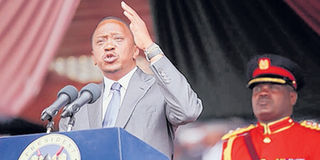Kenya ‘shuts’ United States NGO working on 2017 polls

President Uhuru Kenyatta speaks during Mashujaa Day celebrations at Nyayo Stadium on October 20, 2104. Kenyatta is seeking a second term in office in the August 8 presidential election. PHOTO| FILE
What you need to know:
- The missive from the ministry of devolution and planning ordered the International Foundation for Electoral Systems (IFES) to immediately stop its $20 million (19 million euro) electoral assistance program, as it was not registered as an NGO in Kenya.
Nairobi. Kenyan authorities on Monday ordered the shutdown of an American NGO working on programmes related to the country’s 2017 presidential election, according to a letter seen by AFP.
The missive from the ministry of devolution and planning ordered the International Foundation for Electoral Systems (IFES) to immediately stop its $20 million (19 million euro) electoral assistance program, as it was not registered as an NGO in Kenya.
It also said all foreigners working for IFES had not obtained work permits, and were considered to be working in the country illegally.
“The purpose of this communication therefore is to direct (IFES) to immediately cease all operations in the country ... until such time that IFES shall acquire a certificate of registration,” read the letter.
President Uhuru Kenyatta last week issued a warning to foreign countries who he accused of wanting to influence the 2017 polls by funding civil society organisations.
“There is already money coming from abroad in the guise of promoting good governance or civic education, however it’s true intention is to influence our electoral choice,” he said.
“I urge all Kenyans to reject such interference, this is our country and no one should ever control our choices for their own selfish interest.”
According to its website, IFES, which is funded by the United States Agency for International Development (USAID) is involved in a program to “strengthen key electoral institutions, improve citizen participation in the full electoral process, and promote dialogue and consensus-building to mitigate conflict.”
To do this the NGO seeks out local partners to improve issues related to voter registration, voter education, electoral dispute resolution and the transmission and verification of election results.
Kenyatta is seeking a second term in office in the August 8 presidential election.
Early campaigning has already seen politicians urging Kenyans to shy away from the political tribalism that led to deadly violence in 2007-08 polls that left over 1,200 dead.
However, inevitably, ethnic affiliations will play a key role in voting, and observers are keen to avoid a replay of the crisis.
Polls in 2013 were peaceful, but flawed, with a host of hi-tech safeguards -- including a biometric voter registration system -- failing on the day.
Kenya’s election commission, accused of bias and corruption, resigned in October after violent opposition-led protests.
Interviews are currently under way for new election commissioners. (AFP)




